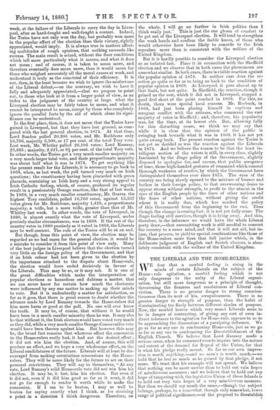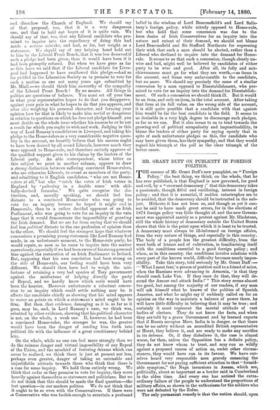THE LIBERALS AND THE HOME-RULERS.
WR fear that a morbid feeling is rising in the minds of certain Liberals on the subject of the Home - rule agitation, a morbid feeling which is not only dangerous to the unity of the Liberal organi- sation, but still more dangerous as a principle of thought, threatening the firmness and resoluteness of Liberal con- viction. There is no greater danger to strong conscien- tiousness than its next of kin, scrupulousness. There is no greater danger to strength of purpose, than the habit of discriminating too finely between different shades of purpose. Now, the morbid horror which very sound Liberals seem to be in danger of contracting, of giving any sort of even in- direct tolerance to the agitation for Home-rule, appears to us to be approaching the dimensions of a paralysing influence. We go as far as any one in condemning Home-rule, just as we go as far as any one in condemning the Disestablishment of the English Church. We believe that Lord Ramsay made a serious error, when he consented even to inquire into the nature and extent of the demand for Repeal of the Union, for that is what his pledge really meant. So far as our own impres- sion is worth anything,—and no man's is worth much,—we hold that he lost as much as he gained by that pledge, if not more. We trust that his example will not spread. We believe that nothing can be more unwise than to hold out vain hopes of mischievous measures ; and we believe that to hold out any hope of tampering with the legislative Union of these Islands is to hold out very vain hopes of a very mischievous measure. But then we should say much the same,—though the subject belongs, perhaps, to a somewhat, though only somewhat, lower range of political significance,—of the proposal, to disestablish
and disendow the Church of England. We should say of that proposal, too, that it is a very dangerous one, and that to hold out hopes of it is quite vain. We should say of that, too, that any Liberal candidate who pro- mised to inquire into the expediency of doing this had made a serious mistake, and had, so far, lost weight as a statesman. We should say of any helping hand held out to him by the Liberal Front Bench, that it was less deserved if such a pledge had been given, than it would have been if it had been promptly refused. But when we have gone as far as this, have we said that if the Liberal candidate for Liver- pool had happened to have swallowed this pledge,—had so far yielded to the Liberation Society as to promise to vote for such a motion as one not many years ago submitted by Mr. Miall,—we should think him unworthy of the sympathy of the Liberal Front Bench ? By no means. All things in politics are questions of balance. You must set off your loss in what your representative hopes to do that you disapprove, against your gain in what he hopes to do that you approve, and after also weighing his personal character, and forming your opinion how far that is likely to make him useful or dangerous in relation to questions on which he does not pledge himself, you must decide on the whole issue whether his success be or be not a result for which you ought to wish and work. Judging in this way of Lord Ramsay's candidature in Liverpool, and taking his pledge to the Home-rulers as a very considerable negative quan- tity in the account, we heartily believe that his success ought to have been desired by all sound Liberals, however much they were opposed to Home-rule, and therefore entirely approve of the qualified support given to his claims by the leaders of the Liberal party. An able correspondent, whose letter on this subject we print in another column, appears to draw a strong distinction between suffering convinced Home-rulers, who are otherwise Liberals, to count as members of the party, and admitting to it English candidates, " who are not Home- rulers at all," but who " catch the votes of Irish voters in England by ' paltering in a double sense' with skil- fully-devised formulas." We quite recognise the dis- tinction, and, morally speaking, we should feel less distaste to a convinced Home-ruler who was going to vote for an inquiry because he hoped it might end in Home-rule, than to a rather decided opponent of an Irish Parliament, who was going to vote for an inquiry in the vain hope that it would demonstrate the impossibility of granting the Irish demand. But we are far from saying that we should feel less political distaste to the one profession of opinion than to the other. We should feel the strongest hope that whatever concessions a promising young statesman like Lord Ramsay had made, in an unfortunate moment, to the Home-rule party, he would repair, as soon as he came to inquire into the matter more closely, especially if we had been aware of his strong personal bias against the restoration of an Irish Parliament to Ireland. But, supposing that his own conviction had been strong on the side of Home-rule, our feeling would have been very different. We should then have had to weigh the mis- fortune of retaining a very bad species of Tory government against the misfortune of helping directly the party of Repeal, and we hardly know which scale would have been the heavier. However unfortunate a reluctant conces- sion to an inquiry which could settle nothing may be, it affects the candidate chiefly as showing that his mind appears to waver on points on which a statesman's mind ought to be firm. But then, that evidence, damaging as it is, so far as it goes, may be, and, in Lord Ramsay's case, we think was, rebutted by other evidence, showing that his political character is not, on the whole, a weak one. If, however, he had been a convinced Home-ruler, the stronger he was, the greater would have been the danger of sending him forth into political life with the influence of a great constituency behind him.
On the whole, while no one can feel more strongly than we do the ruinous danger and virtual impossibility of any Repeal of the Union, and the mischief of fostering dreams which can never be realised, we think there is just at present not less, perhaps even greater, danger of taking an untenable and unjustifiable attitude towards those who think that there is a case for some inquiry. We hold them entirely wrong. We think that so far as they promise to vote for inquiry, they score heavily against themselves as statesmen and politicians. But we do not think that this should be made the final question—the test question—in our modern politics. We do not think that it ought to be so even with the Conservatives. If there were a. Conservative who was foolish enough to entertain a profound
belief in the wisdom of Lord Beaconsfield's and Lord Salis- bury's foreign policy, while utterly opposed to Home-rule, but who held that some concession was due to the keen desire of Irish Conservatives for an inquiry into the nature and extent of their demand, we should not blame Lord Beaconsfield and Sir Stafford Northcote for expressing their wish that such a man should be elected, rather than a Liberal who declined to inquire into the demand for Home- rule. It seems to us that such a concession, though clearly un- wise and bad, might well be believed by candidates of either party to be wise and good. After all, its folly and mis- chievousness must go for what they are worth,—as items in the account, and items very unfavourable to the candidate, but no more. We should say precisely the same of a similar concession by a man opposed to Disestablishment, who pro- mised to vote for an inquiry into the demand for Disestablish- ment. Of such a concession we should think ill. But it would be an item, and only an item, in the total account. After taking that item at its full value, on the wrong side of the account, it is still quite possible that a candidate with that against him would be far the best candidate in the field. It seems to us desirable in a very high degree to discourage such pledges, so far as we can. But it also seems to us to tend towards the growing evil of political scrupulosity and impracticability, to blame the leaders of either party for saying openly that in spite of such unfortunate pledges as this, the candidate who may have given them, has their sympathy, and that they would. regard his triumph at the poll as the clear triumph of the better cause.



































 Previous page
Previous page